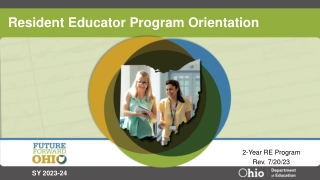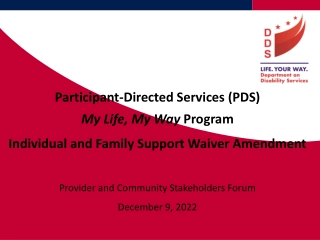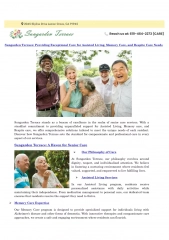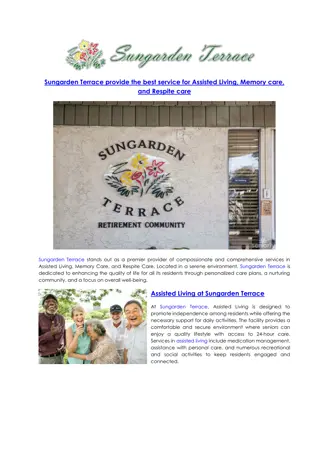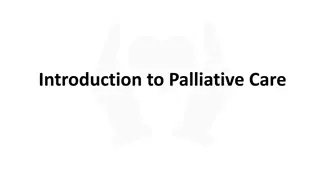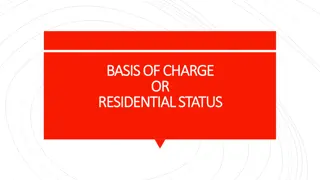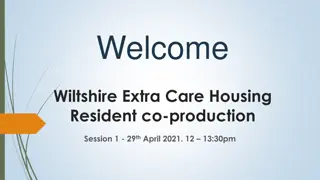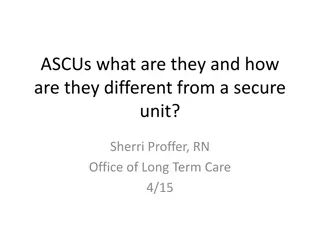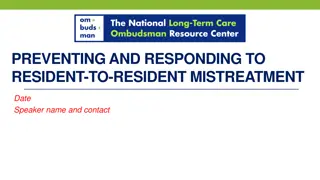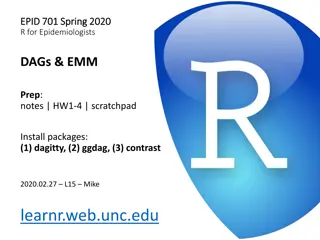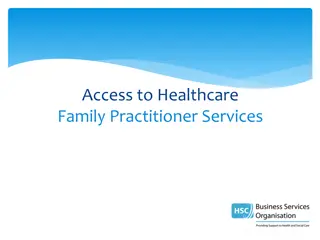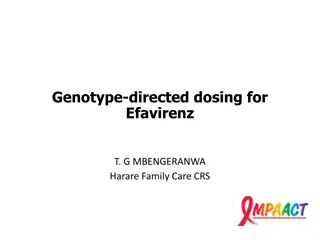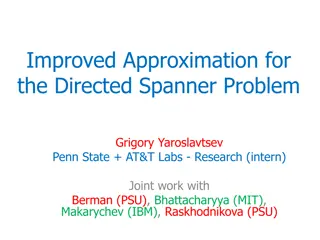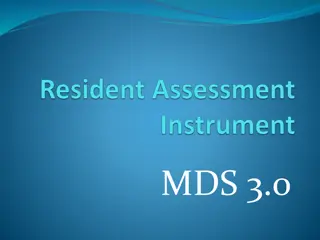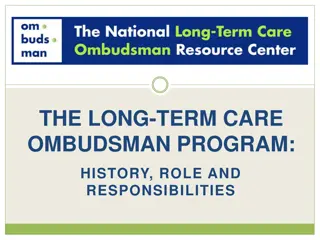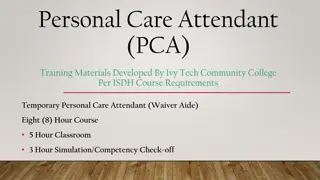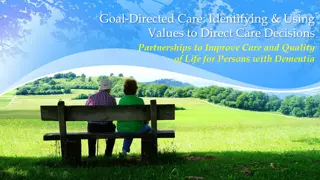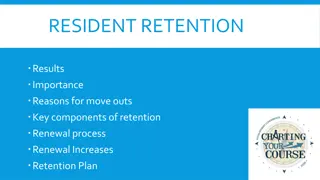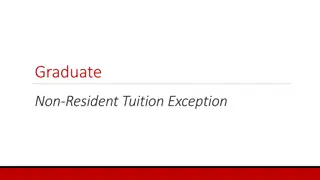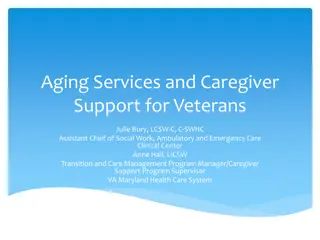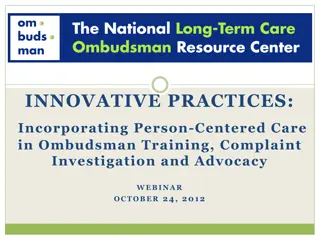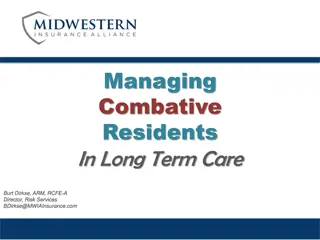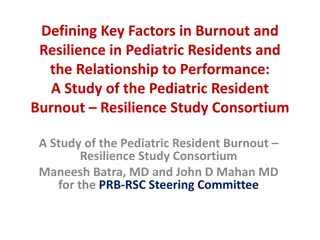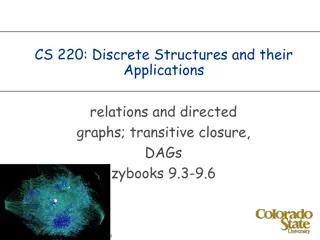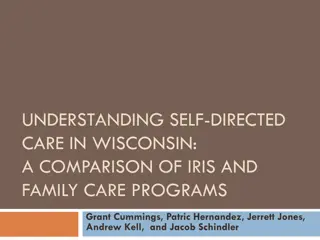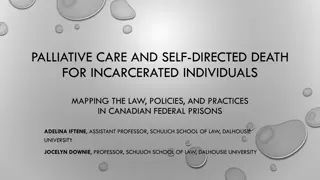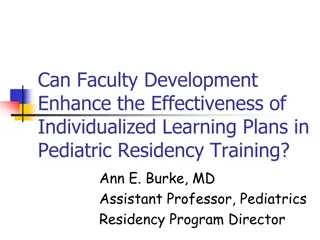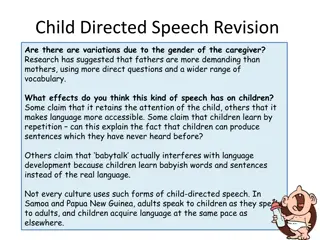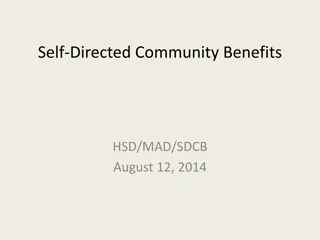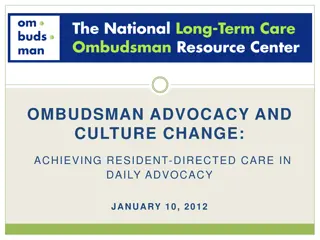Resident Educator Program Orientation
This orientation program provides information on the Ohio Resident Educator Program, including topics such as teacher residency and induction programs, mentoring principles, and the Resident Educator Summative Assessment (RESA). It also discusses the different types of Resident Educator Licenses and
1 views • 26 slides
Participant-Directed Services (PDS)
The new service option, Participant-Directed Services (PDS), in the Individual and Family Support (IFS) Waiver. PDS offers district residents enrolled in the IFS Waiver the opportunity to have more choice, control, and flexibility over the services they receive, allowing them to live in their natura
1 views • 20 slides
Sungarden Terrace provide the best service for Assisted Living, Memory care
ASSISTED LIVING\nWe want our residents to achieve the highest living capabilities with our supportive staff to help keep their independence. Our highly trained care staff is focused on person-centered care, allowing the resident to gain confidence in our services while building mutual respect. This
1 views • 4 slides
Sungarden Terrace provide the best service for Assisted Living, Memory care, and Respite care
We want our residents to achieve the highest living capabilities with our supportive staff to help keep their independence. Our highly trained care staff is focused on person-centered care, allowing the resident to gain confidence in our services while building mutual respect. This along with person
2 views • 3 slides
Quick MD Care_ Your Trusted Partner in Primary Care Medicine
Quick MD Care: Your Trusted Partner in Primary Care Medicine\n\nWelcome to Quick MD Care, where compassionate primary care meets convenience. We understand the importance of having a trusted partner in managing your health. Our team of dedicated primary care doctors is committed to providing persona
5 views • 2 slides
Understanding Palliative Care: Enhancing Quality of Life in Serious Illness
Palliative care is a holistic approach focused on improving the quality of life for patients and their families dealing with life-threatening illnesses. It involves early identification, assessment, and treatment of pain and other physical, emotional, and spiritual issues. This comprehensive trainin
0 views • 60 slides
Child Care and Youth Programs at Minot AFB
Offering a range of child care services including Child Development Center for ages 6 weeks to 5 years, School Age Care for Kindergarten to 12 years, Family Child Care Program, and Youth Programs for ages 9-18. Services include full-time care, before/after school care, extended duty care, emergency
1 views • 6 slides
Understanding Residential Status for Income Tax Purposes
Tax is levied on the total income of an individual based on their residential status as per the Income-tax Act, 1961. The Act classifies assessable persons into Ordinary Resident, Resident but not Ordinarily Resident, and Non-Resident. Residential status is determined by the physical presence of an
0 views • 26 slides
Wiltshire Extra Care Housing Resident Co-production Session
Welcome to the Wiltshire Extra Care Housing Resident Co-production Session where the focus is on discussing a new support model for extra care. The session includes introductions, presentations, breakout groups for sharing ideas, and receiving feedback on the proposed approach to co-production. Join
1 views • 23 slides
Understanding Normal Human Microbiota and Its Role in Health
Normal human microbiota refers to the microorganisms residing on our skin and mucous membranes, playing vital roles in digestion, immunity, and protection against pathogens. They are categorized into resident and transient groups, with resident flora aiding in maintaining health by synthesizing nutr
0 views • 28 slides
Understanding ASCUs: How They Differ from Secure Units in Care Facilities
ASCUs (Alzheimer's Special Care Units) have specific requirements to ensure residents receive appropriate care and services. They differ from secure units by focusing on resident-centered care, specialized training, and maintaining detailed records. Facilities advertising as ASCUs must adhere to gui
0 views • 15 slides
Preventing and Responding to Resident-to-Resident Mistreatment in Long-Term Care Facilities
Resident-to-resident mistreatment (RRM) in long-term care settings can cause physical and psychological distress to residents. This presentation covers the definition of RRM, practical solutions for prevention, the importance of individualized care, and reporting procedures. Examples of RRM include
0 views • 27 slides
Understanding Directed Acyclic Graphs (DAGs) for Causal Inference
Directed Acyclic Graphs (DAGs) play a crucial role in documenting causal assumptions and guiding variable selection in epidemiological models. They inform us about causal relationships between variables and help answer complex questions related to causality. DAGs must meet specific requirements like
1 views • 63 slides
The Importance of Directed Time Calendars in Managing Workload
Understanding directed time calendars is essential for educators to manage workload effectively. These calendars outline teachers' working hours and responsibilities, helping to combat excessive workload issues. By monitoring directed time and engaging in the bargaining calendar, educators can addre
0 views • 8 slides
Child Care Challenges in Kentucky: The Child Care Cliff
Explore the landscape of child care in Kentucky, revealing the challenges families face with the Child Care Cliff. Discover statistics on child care centers, family child care homes, and the average cost of child care in Kentucky. Understand the importance of the Child Care Assistance Program (CCAP)
0 views • 18 slides
Long-Term Care Regulation Provider Meeting Overview 2016
Long-term care regulation provider meeting in 2016 covered key scenarios like releasing or refusing readmission of residents, inability to meet resident needs, improved resident health, safety and health concerns, resident payment failures, and facility closure. Documentation requirements from physi
0 views • 23 slides
Admission, Transfer, and Discharge Guidelines for Virtual Resident Family Action Council
Explore essential information on admission procedures, rights, services, and practitioner affiliations for Virtual Resident Family Action Council members. Understand the materials you should receive, refund and bed hold policies, assessments, and resident rights. Be informed before signing any agree
0 views • 52 slides
Understanding Access to Healthcare in Northern Ireland
Access to healthcare services in Northern Ireland is crucial for the well-being of residents and eligible visitors. Family Practitioner Services play a significant role in providing advice, training, and verification for entitlement to publicly funded healthcare. The main legislation, including the
0 views • 19 slides
Genotype-Directed Dosing for Efavirenz in Children Study
The study focuses on genotype-directed dosing of Efavirenz in children with HIV, aiming to optimize treatment options and dosages based on genetic factors. It explores the challenges in treating children with HIV, especially in resource-limited settings, and discusses the impact of genetic variation
0 views • 21 slides
Improved Approximation for the Directed Spanner Problem
Grigory Yaroslavtsev and collaborators present an improved approximation for the Directed Spanner Problem, exploring the concept of k-Spanner in directed graphs. The research delves into finding the sparsest k-spanner, preserving distances and discussing applications, including simulating synchroniz
0 views • 20 slides
Comprehensive Guide to MDS 3.0 and RAI Manual
Detailed breakdown of the Minimum Data Set (MDS) 3.0 and the Resident Assessment Instrument (RAI) Manual, including chapters on assessments, care planning, submission processes, and the Skilled Nursing Facility Prospective Payment System. The manual provides crucial information on completing MDS ite
0 views • 78 slides
The Long-Term Care Ombudsman Program: History, Role, and Responsibilities
Long-Term Care Ombudsmen (LTCOs) act as resident advocates, ensuring quality care and quality of life in long-term care facilities. Established in 1972 under the Older Americans Act, the program has evolved to cover various types of care facilities. LTCOs investigate and resolve complaints, advocate
0 views • 16 slides
Temporary Personal Care Attendant Training Program by Ivy Tech Community College
This training program, developed by Ivy Tech Community College as per ISDH course requirements, is designed for Temporary Personal Care Attendants (Waiver Aides) to address staffing shortages due to the COVID-19 pandemic. Candidates must be at least 16 years old with no specific educational requirem
0 views • 71 slides
Celebrating Staff Dedication and Achievements at Carmel Valley Manor
Today, we recognize the dedicated staff at Carmel Valley Manor for their exceptional service totaling 367 years. The community board meeting, admissions committee update, and medical committee report reflect a commitment to resident care and safety. The facility strives for active independent living
0 views • 26 slides
Enhancing Dementia Care through Goal-Directed Approaches
This content delves into the importance of goal-directed care in improving the quality of life for individuals with dementia. It covers shifting the focus of care from disease-based to person-centered approaches, outlining the goals of dementia care at different stages, and emphasizing the value of
0 views • 19 slides
Impacts of Marketisation on Home Care for Older People in Urban China
This study by Wenjing Zhang from the University of Bristol delves into the effects of the marketisation process on home care for the elderly in urban China. It explores the rationale behind the marketisation of care, the trends in home care marketisation, and the processes involved. The background s
0 views • 19 slides
Enhancing Resident Retention Strategies for Property Managers
Explore the importance of resident retention, key components of successful programs, reasons for move-outs, and ways to improve retention rates. Learn how to create a welcoming environment, utilize customer service, enhance maintenance follow-ups, and boost resident satisfaction to stabilize propert
0 views • 15 slides
Graduate Non-Resident Tuition Exception Form Overview
Explore the Graduate Non-Resident Tuition Exception Form, an online tool for submitting requests for non-resident tuition waivers. This comprehensive guide covers the form's structure, pre-populated sections, requester and student information input, funding request details, and the submission proces
0 views • 23 slides
Comprehensive Aging Services and Caregiver Support for Veterans
Veterans can access a variety of aging services and caregiver support resources through the VA Maryland Health Care System. Eligibility is determined based on service connection and financial thresholds. Services include homemaker/home health aide, adult day health care, respite care, continued home
0 views • 23 slides
Innovative Practices in Ombudsman Training for Person-Centered Care
Incorporating person-centered care principles in ombudsman training is vital for enhancing the quality of long-term care services. This webinar held on October 24, 2012, discussed the application and implementation of innovative practices from state programs to advocate for quality care, resident ri
0 views • 28 slides
Managing Combative Residents in Long-Term Care
Residents in long-term care facilities may exhibit combative behaviors due to underlying psychiatric conditions, cognitive impairment, or dementia. This aggression poses challenges for both staff and other residents. Caregiver training is crucial for identifying triggers and managing combative episo
0 views • 17 slides
Pediatric Resident Burnout & Resilience Study Consortium Overview
This study aims to investigate the factors influencing burnout and resilience in pediatric residents, with a focus on enhancing well-being and performance. The Pediatric Resident Burnout Resilience Study Consortium (PRB-RSC) involves over 20 residency programs in the U.S. to examine the epidemiology
0 views • 18 slides
Understanding Subacute Care: Types of Residents and Care Settings
Subacute care involves providing specialized care for individuals who require more attention than what typical long-term care facilities can offer. This level of care is provided in settings like hospitals or certain units within long-term care facilities. Residents in subacute care settings need a
0 views • 62 slides
Understanding Directed Graphs and Adjacency Matrices in Discrete Structures
Explore the concepts of binary relations, directed graphs, adjacency matrices, transitive closure, and walks in the context of discrete structures. Learn how vertices, edges, in-degrees, out-degrees, and self-loops are defined in directed graphs. Understand the importance of adjacency matrices in re
0 views • 28 slides
A Comparison of IRIS and Family Care Programs in Wisconsin
IRIS (Include, Respect, I-Self-Direct) and Family Care are two long-term care programs in Wisconsin providing services to elders and individuals with disabilities. IRIS, initiated in 2008, offers self-directed care options, while Family Care, authorized in 1998, aims to enhance consumer independence
0 views • 45 slides
Understanding Palliative Care and Self-Directed Death in Canadian Federal Prisons
Analyzing the need for palliative care and self-directed death among incarcerated individuals in Canadian federal prisons, this study explores key demographics, disease prevalence, mortality rates, and challenges in obtaining parole. With an aging prison population and higher disease prevalence comp
0 views • 51 slides
Enhancing Individualized Learning Plans in Pediatric Residency Training
The study focuses on whether faculty development intervention can enhance the effectiveness of Individualized Learning Plans (ILPs) in pediatric residency training. It aims to improve faculty and trainee experiences with ILPs, including increasing faculty perception of ILP importance, self-directed
0 views • 16 slides
Insights into Child-Directed Speech Variations and Effects
Research examines variations in child-directed speech due to caregiver gender, with fathers often being more demanding than mothers. Such speech impacts children's attention, language accessibility, and learning mechanisms, showcasing contrasting views on its effectiveness. The article delves into p
0 views • 10 slides
Self-Directed Community Benefits Program Overview
Self-Directed Community Benefits (SDCB) program provides benefits to eligible members in New Mexico. To qualify for SDCB, members must meet certain criteria and have a Care Coordinator and Support Broker. Other entities involved include the Employer of Record, Financial Management Agency, and Income
0 views • 86 slides
Transforming Long-Term Care: Resident-Directed Culture Change
The content discusses the crucial shift towards resident-directed care in long-term care facilities through culture change practices, emphasizing person-first language, resident empowerment, and system improvements. It explores the philosophy, practices, and language adaptations necessary to enhance
0 views • 31 slides
